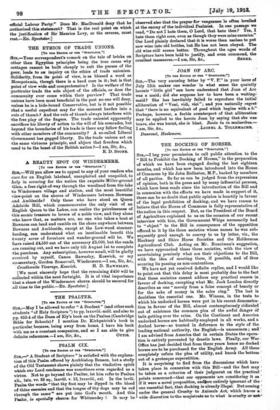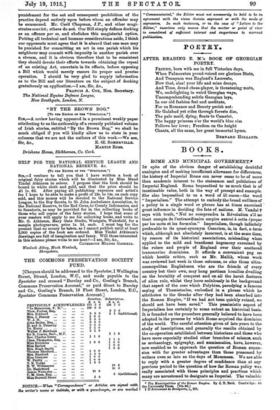THE DOCKING OF HORSES.
[To THE EDITOR OF THE "SPECTATOR...1
Sin,—I beg your permission to call public attention to the " Bill to Prohibit the Docking of Horses," in the preparation of which we have been engaged during the last eighteen months, and which has now been introduced into the House of Commons by Sir John Rolleston, M.P., backed by members of all parties. So far as can be judged from the expressions of opinion, both in the press and by many influential persons, which have been made since the introduction of the Bill and in connexion with the efforts we have made in support of it, there can be no doubt that public opinion is heartily in favour of the legal prohibition of docking, and we have reason to believe that the House of Commons is fully representative of , the nation in this respect. But, as the President of the Board of Agriculture explained to us on the occasion of our recent interview with him, the Government Whips necessarily had to "object" to the Bill in consequence of the opposition offered to it by the three societies whose names he was sub- sequently good enough to convey to us by letter, viz., the Hackney and Shire Horse Societies and the Holderness Agricultural Club. Acting on Mr. Runciman's suggestion, we have approached these three societies, with the view of ascertaining precisely what are their objections to the Bill, with the idea of meeting them, if possible, and of thus securing its passing as non-contentious.
We have not yet received definite replies, and I would like to point out that this delay is most probably due to the fact that these societies cannot adduce any practical reason in favour of docking, excepting what Mr. Jack London directly describes as one " merely from a false concept of beauty or for the sake of money in the sales ring." The last is doubtless the essential one. Mr. Winans, in the tests to which his undocked horses were put in his recent demonstra- tion in favour of the Bill, almost contemptuously ridiculed out of existence the common plea of the awful danger of tails getting over the reins. On the Continent and America undocked horses are habitually employed in all works, and a docked horse—so treated in deference to the style of the leading national authority, the English—is uncommon ; and I am advised from America that in certain States the opera- - tion is entirely prevented by drastic laws. Finally, our War Office has just decided that from three years hence no docked horses are to be purchased for the English Army. All these completely refute the plea of utility, and knock the bottom out of a grotesque superstition.
It is surprising to find from the discussions which have taken place in connexion with this Bill—and the fact may be taken as a criterion of their judgment on the practical ' points concerned—that our opponents are considering it as if it were a novel proposition, andlare entirely ignorant of the ' one essential fact, that docking is already illegal. But coming ' under the general Cruelty to Animals Act, which leaves a wide- diseretion to-the magistrate its to what is cruelty or neta
punishment for the act and consequent prohibition of the practice depend entirely upon before whom an offender may be summoned. Mr. Cecil Chapman, /P., and other magi- strates convict; others do not. Our Bill simply defines docking as an offence per se, and abolishes this magisterial option. Putting all technical and humane considerations aside, I think our opponents must agree that it is absurd that one man may be punished for committing an act in one parish which his neighbour may commit with impunity in another parish over a stream, and it is obvious therefore that to be consistent they should devote their efforts towards obtaining the repeal of an existing Act, uncertain in its effects, before opposing a Bill which would merely ensure its proper and precise operation. I should be very glad to supply information as to the Bill and our literature on the subject of docking gratuitously on application.—I am, Sir, &c., New Southgate, London, N.











































 Previous page
Previous page